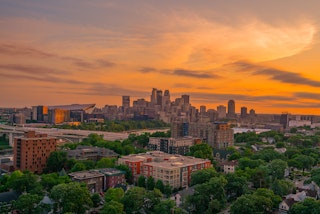Tapping Into Our Strengths

While we are all still processing the myriad emotions associated with the death of Mr. Floyd, Meet Minneapolis and our local hospitality/tourism partner businesses are working to restart our industry. To effectively do this, we must look at what assumptions have changed in the competitive landscape in order to adapt our strategies. Let’s look at a collection of converging events that may create some obstacles and opportunities in our journey toward restarting: business travel resumption, our changing competitive set of cities and our evolving community reputation.
Business Travel
According to information compiled by Meet Minneapolis’ Senior Research Manager Ashley Adams, business travel has consistently represented more than a quarter of all business to our metro area. Business travel represents even more than that in terms of the overall revenue it generates, because of its higher rates, its consistency and overall volume. COVID-19 has significantly diminished business travel to our region, as well as nationally, and it is uncertain when it will return to some level of normalcy. Without this perennially reliable base of business travel, Meet Minneapolis and its hotel partners will need to “group up” according to our SVP of Destination Sales, Brent Foerster, at least for the short term, in order to offset the decline in business travel. This is an opportunity to become an even more prolific destination for groups.
Evolving Competitive Set
Whenever there is a decline in group and individual travel, there is a change in the list of destinations with which we compete. Chicago, Denver, Indianapolis, Kansas City, Louisville and St. Louis make up our primary competitive set – Chicago being the city to which we lose the most business. In an overall decline in business nationally, we can expect to see Chicago even more frequently on our lost business reports. Austin, Nashville, New Orleans, and San Antonio are among the cities in our secondary or emerging set of competitors. We can expect to see them more in head-to-head bids as they must get more aggressive and diverse in their business development efforts. We must also be aware of cities like Las Vegas that have the resources available to provide considerable incentives for group business they deem valuable. Nonetheless, we have competed effectively against major cities for large events. My favorite example is when we beat out New Orleans to win Super Bowl LII. Once again, we have an opportunity to put our collective community sales and marketing skills on display.
Community Reputation
Meet Minneapolis’ ability to successfully recruit individual visitors, meetings, conventions and events is intrinsically bound to how our customers perceive our destination. Our city’s reputation has benefited from such factors as a perennially low unemployment rate, an all-star list of Fortune 500 companies and frequent top placements on numerous “best of” lists. This success shows the world the culture of innovation and achievement that has been nurtured over the years.
But the events of May 25 pulled back the curtain on the collection of unresolved racial inequity and social injustice issues that have met their day of reckoning in our community. More and more people are seeing the racial inequality and the broad disparities in achievement, employment, healthcare and home ownership and equally disproportionately high arrest, death in custody and incarceration rates for Black Minnesotans.
That culture of innovation that has made us the envy of the nation can also be the very conduit to help resolve our racial inequities. We have the resources that, if properly deployed, can create solutions that other communities can replicate.
- We’ve invented life-saving medical devices.
- We have world-class educational institutions.
- We have a creative community with deep roots
- We have strategic thinkers in the public and private sectors who can dream big and breathe life into those dreams.
Is the community resolve there?
We’ve hosted a string of major events that no other community can rival. Imagine how much more our community reputation can grow if we marshal the resources to holistically deal with problems that have been swept under the rug for decades.
And imagine how much more our national reputation will benefit from success in developing a sustainable roadmap for socioeconomic equity.
We just need to tap into our strengths.

